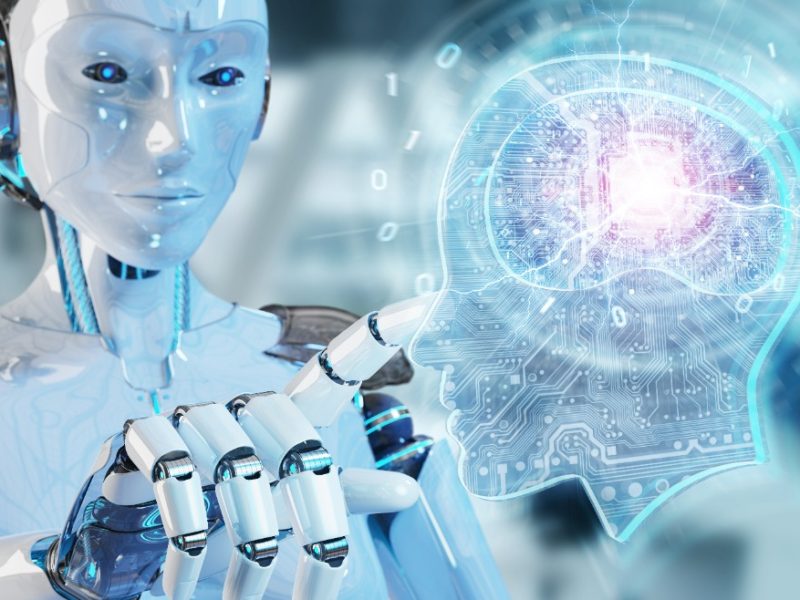
“AI is not a futuristic technology; it is here now, transforming industries and improving lives. Let us harness its power responsibly to create a better future for all.”
– Sundar Pichai
Introduction:
The journey of artificial intelligence (AI) within the field of healthcare is a captivating tale of innovation and progress. From its nascent stages to becoming an important part of modern medicine, AI’s evolution has been marked by continuous advancements aimed at enhancing patient care. AI basically means computer systems imitating how humans think. Imagine if we blend this technology with healthcare. This mix has big potential for doctors and patients, and it’s changing the way we look at healthcare like never before.
From its early days as basic data systems to advanced diagnostic tools, growth of AI has been truly remarkable. Each day, the industry incorporates and refines these systems, pushing the boundaries of what’s possible and redefining the standards of care.
Important Milestones of AI integration in Healthcare:
The journey of integrating artificial intelligence (AI) into healthcare has been marked by several significant milestones that have reshaped how we approach patient care and medical practices. The important milestones are AI-driven diagnostics, predictive analytics, and robotic-assisted surgeries, which have not only revolutionized medical procedures but also enhanced the overall quality of healthcare.
AI-driven diagnostics stand out as a pivotal advancement in healthcare. These tools harness the power of machine learning algorithms to analyze vast amounts of patient data, enabling healthcare providers to make quicker and more accurate diagnoses. By detecting patterns and anomalies in medical images, genetic information, and clinical records, AI-driven diagnostics have enabled early disease detection and personalized treatment plans, ultimately leading to improved patient outcomes and satisfaction.
Another milestone in AI integration is predictive analytics. By leveraging historical patient data, predictive analytics algorithms can anticipate and estimate patterns among huge patient datasets and predict disease progression, also identify high-risk patients, and recommend tailored treatment strategies. This proactive approach not only enhances patient care but also helps healthcare organizations optimize resource allocation and streamline operations, eventually reducing time and costs to provide healthcare.
Robotic-assisted surgeries represent a significant leap forward in surgical techniques. These AI-powered systems provide surgeons with enhanced precision and control during complex procedures, leading to shorter recovery times and improved patient outcomes. By assisting surgeons in performing minimally invasive surgeries with greater accuracy and precision, robotic-assisted surgeries have revolutionized the field of surgery and expanded treatment options for patients.
Looking ahead, it’s clear that AI has the potential to further transform healthcare delivery, offering new opportunities to enhance patient care and improve outcomes. As we continue to integrate AI technologies into healthcare practices, it’s essential to prioritize collaboration, innovation, and ongoing improvement. By working together, we can unlock the full potential of AI and create a healthcare system that is more personalized, efficient, and compassionate for all.
How is AI used in Streamlining Patient Care:
Artificial intelligence is transforming patient care by streamlining processes and enhancing the overall healthcare experience. Through various applications, AI optimizes medical procedures, diagnosis, and treatment, leading to improved outcomes and greater efficiency in healthcare delivery. Below are some examples and areas where AI is currently being used.
One significant area where AI is making a difference is in diagnostics. AI-driven diagnostic tools are helping healthcare providers analyze medical images, such as X-rays and MRIs, with remarkable accuracy and speed. For instance, AI algorithms can detect abnormalities in medical scans that may go unnoticed by human eyes, enabling earlier detection of diseases like cancer. This early detection leads to timely intervention and better treatment outcomes for patients.
Another area where AI streamlines patient care is through predictive analytics. By analyzing vast amounts of patient data, including electronic health records and genetic information, AI algorithms can identify patterns and predict potential health risks. For example, AI can help healthcare providers predict which patients are at a higher risk of developing certain conditions, allowing for proactive interventions and preventive measures to be implemented.
Moreover, in health administration AI-powered virtual health assistants and chatbots are revolutionizing patient engagement and communication. These intelligent systems can provide patients with personalized health information, answer medical queries, and even schedule appointments also by maintaining privacy and security of the personal information and data. By automating these tasks, AI frees up healthcare professionals’ time, allowing them to focus on providing quality care to patients.
Furthermore, AI-driven decision support systems assist healthcare providers in making more informed and evidence-based decisions. These systems analyze patient data in real-time, recommend treatment options, and help doctors identify the most effective course of action for each patient. By leveraging AI, healthcare providers can deliver more personalized and tailored treatments, leading to improved patient outcomes and satisfaction.
In conclusion, as AI continues to advance, its potential to streamline patient care and improve health outcomes will only continue to grow, promising a brighter and more efficient future for healthcare.
The Potential Hurdles and Solutions in AI-Driven Healthcare:
With advancement comes challenges, with the faster advancements of AI in the medical field there are also some challenges we need to figure out. One big hurdle is making sure patient data is kept safe and private. With AI analyzing all this info, there’s a risk of it falling into the wrong hands or being used in ways that aren’t good for patients.
Another thing to think about is making sure AI is accurate and reliable. Sometimes, the algorithms that power AI can make mistakes or be biased, which could lead to wrong diagnoses or treatment recommendations. We’ve got to make sure AI is always improving and being tested to make sure it’s getting things right.
And then there’s the issue of making sure everyone has access to AI-driven healthcare. Not everyone has the same resources or technology, so we need to find ways to make sure everyone can benefit from these advancements, regardless of where they live or how much money they have.
There are solutions to these challenges too. We can use things like encryption and strict privacy policies to keep patient data safe. And we can have regulations in place to make sure AI is held to high standards of accuracy and fairness. Plus, we can work on making AI more accessible and affordable for everyone, so no one gets left behind.
So, while there are some hurdles to overcome in using AI in healthcare, there are also ways we can tackle them. By working together and staying focused on making healthcare better for everyone, we can make sure AI-driven healthcare lives up to its full potential.
Case Study: Successful Stories of AI in Healthcare:
Let us talk about an active case of AI advancement which has transformed this department over the past decade. We are talking about oncology; AI is making huge leaps in revolutionizing how we detect and treat cancer. Take for example a recent study where researchers used AI to analyze medical images like MRI scans and identify signs of cancer. The AI algorithms were able to spot even the tiniest abnormalities that might indicate cancerous growths, sometimes even before they were visible to human eyes. This early detection is crucial because it means patients can start treatment sooner, increasing their chances of survival and recovery.
But that’s not all. AI is also helping oncologists tailor treatments to each patient’s unique needs. By analyzing vast amounts of patient data, including genetic information and treatment histories, AI algorithms can recommend personalized treatment plans that are more effective and have fewer side effects. This means patients are getting treatments that are better suited to their individual circumstances, improving their quality of life during and after treatment.
And let’s not forget about the role of AI in research. By analyzing huge datasets of cancer patients’ information, AI can identify trends and patterns and can give us better. This can lead to new insights into the causes of cancer, the development of more targeted therapies, and even the discovery of new drugs. It’s a game-changer in the fight against cancer, bringing us closer to finding cures and saving lives.
So, in oncology and beyond, AI is proving to be an invaluable tool in the fight against cancer. From early detection to personalized treatment recommendations and groundbreaking research, AI is transforming the way we approach cancer care, offering hope to patients and their loved ones around the world. Similarly, AI is making significant strides in other fields, such as treating chronic diseases and automating tasks in health administration (Faster treatment times) and diagnostic imaging.
Conclusion & Road to Future:
Thinking back on how AI has changed healthcare, it’s clear it’s been a big deal. AI is not only reshaping how we care for patients but also opening doors to new possibilities in medical research and treatment.
Looking to the future, we’re excited about what AI can do. We can expect even faster diagnoses, more personalized treatments, and continued advancements in medical research. But it is also very important to talk openly about how we use AI in healthcare. We want to make sure it’s fair and safe for everyone. By inviting open conversations and ensuring that AI technologies are ethically developed and implemented, we can maximize their potential to improve healthcare for individuals worldwide.
In conclusion, AI is making healthcare better for all of us, where patients receive better care, researchers make new discoveries every day, and healthcare providers are empowered to deliver more effective treatments. We look forward to seeing how it keeps improving and used the right way for everyone’s benefit.
